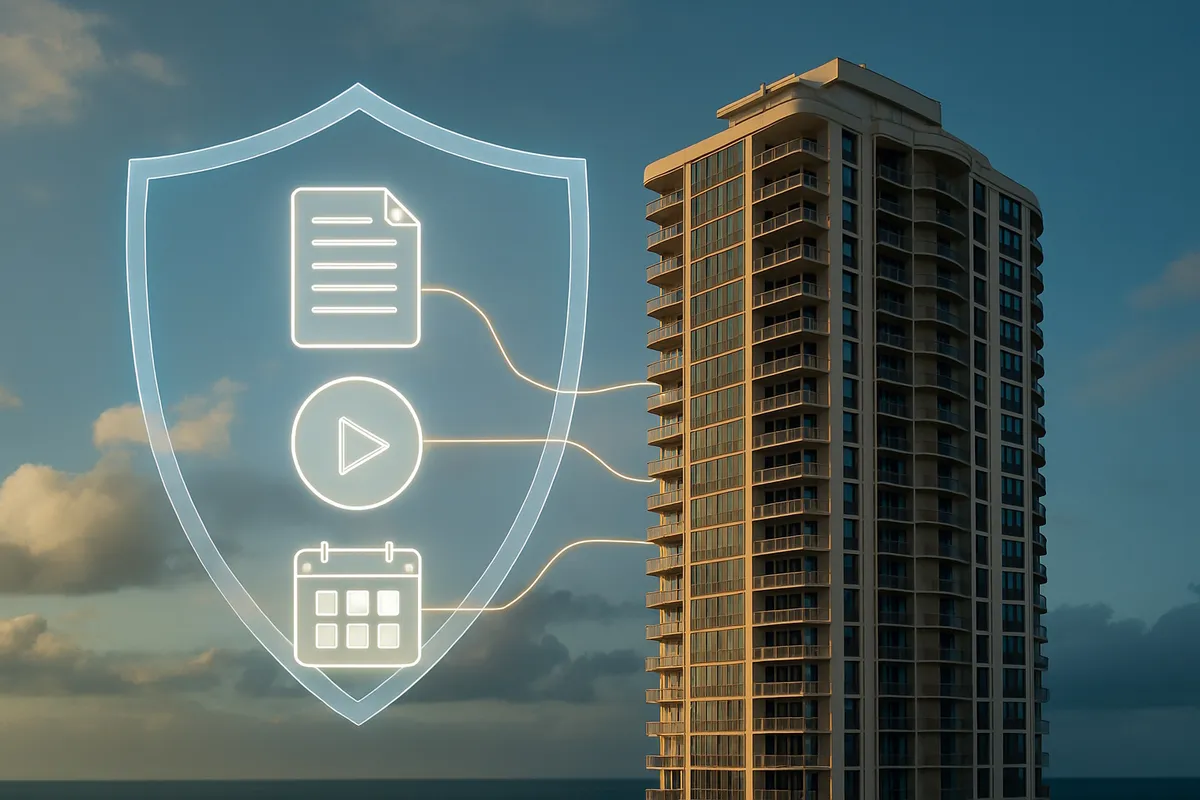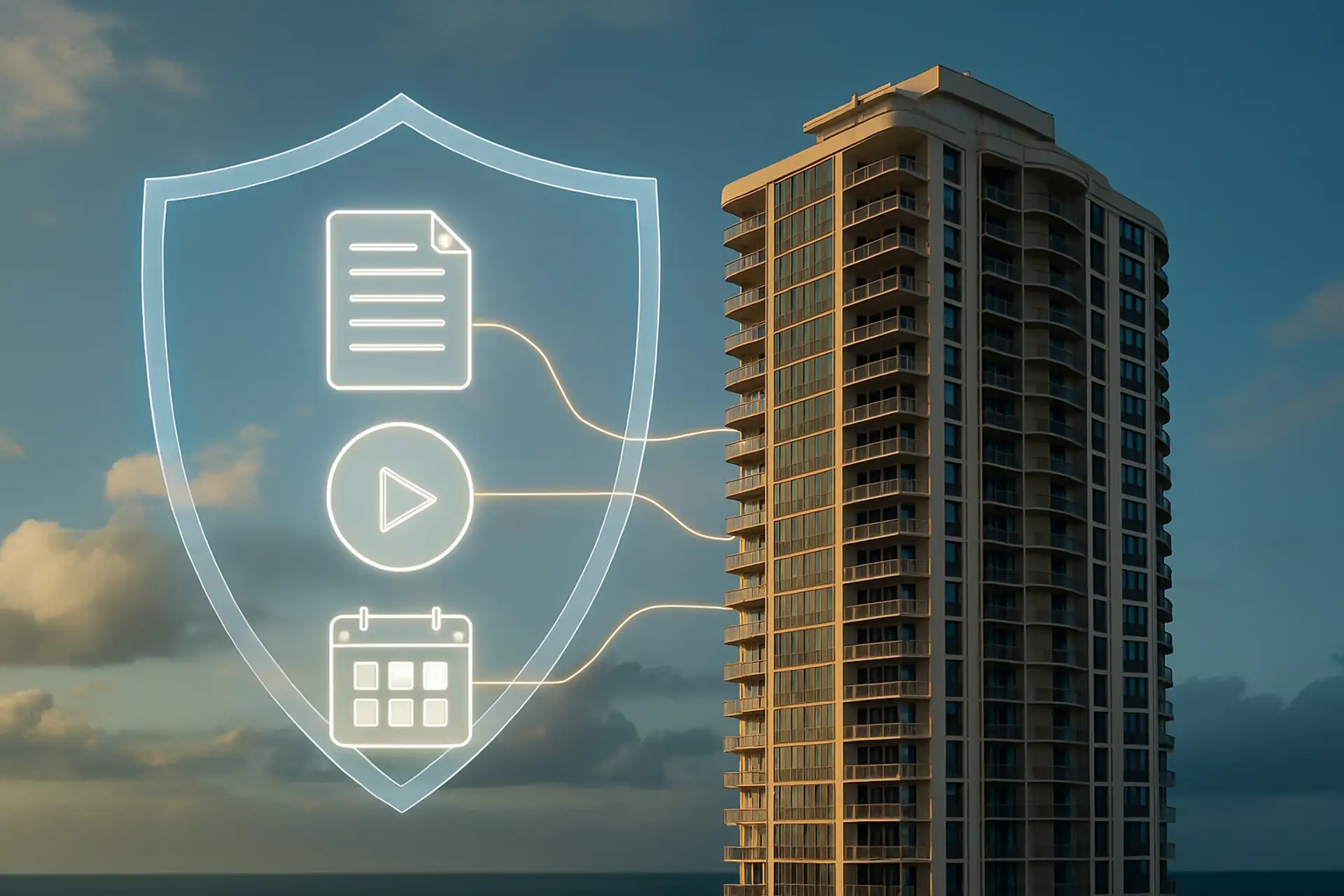What Records Must Be Posted Online Under HB 913 (And What Happens If You Don’t)
July 24, 2025

What Records Must Be Posted Online Under HB 913 (And What Happens If You Don’t)
Table of Contents
- What HB 913 Requires From Florida Condo Boards
- The Official List of Required Records
- What Happens If Records Aren’t Posted
- How to Stay Ahead of the 30-Day Deadline
- Final Thoughts
What HB 913 Requires From Florida Condo Boards
HB 913 is now law in Florida and applies to all condominium associations with 25 or more units. The core of the law requires:
- ✅ Online posting of meeting minutes
- ✅ Public access to virtual meeting recordings
- ✅ A 12-month archive of board actions and decisions
Failure to meet these requirements is considered a violation of Florida Statutes Chapter 718, and may result in complaints, fines, or worse.
The Official List of Required Records
As clarified by the Florida DBPR, your board must ensure the following records are made publicly accessible within 30 days:
✅ Board Meeting Minutes
- Approved and finalized minutes
- One version per meeting
- Archived for at least 12 months
✅ Notices of Meetings
- Initial and revised meeting notices
- Including agenda and voting information
✅ Virtual Meeting Recordings (if applicable)
- Full-length audio or video files
- Must demonstrate mutual audibility
- Stored and posted with the corresponding minutes
✅ Board Action Summaries (optional but encouraged)
- Roll call votes
- Motion results
- Officer statements
“All records required to be maintained by the association… must be available to a unit owner within 10 business days, and digital access is preferred when feasible.”
— Florida Statute § 718.111(12)
What Happens If Records Aren’t Posted
Boards that fail to post required documents face:
- ❌ DBPR Complaints: Any unit owner may file a formal complaint.
- ❌ Civil Penalties: The DBPR may issue fines, conduct audits, or force corrective action.
- ❌ Legal Liability: Boards may be sued by owners for lack of transparency or breach of fiduciary duty.
This is not a theoretical risk. The DBPR receives thousands of complaints annually, and documentation violations are among the most common.
“The failure to timely post board meeting minutes, notices, or digital recordings may constitute a statutory violation enforceable by the Division.”
— Florida Senate HB 913 Summary
How to Stay Ahead of the 30-Day Deadline
✅ Publish on a Rolling Schedule
Set a standing rule: all minutes must be approved and posted within 30 days of the meeting. Automate reminders if needed.
📊 Want a side-by-side feature breakdown of what’s required vs. what you’re doing now?
👉 Download the HB 913 Compliance Matrix →
✅ Designate a Compliance Owner
Assign a board member, CAM, or admin to handle:
- Uploading documents
- Verifying visibility
- Maintaining the archive
✅ Keep a Publishing Log
Track:
- Who uploaded the record
- What file was posted
- When it was published
- Who reviewed or confirmed visibility
✅ Use a Secure, Dedicated Portal
Avoid personal Dropbox accounts or shared email links. HB 913 requires documents to be publicly visible — ideally under a branded, legally defensible portal.
Final Thoughts
HB 913 compliance starts with knowing what to post. Florida law now expects your board to maintain transparent, accessible records — and those that don’t may find themselves at the center of a DBPR complaint or lawsuit.
👉 Start Your Free Trial →
CondoDataHost was built for this exact purpose. We automate record deadlines, archive access, and audit-proof logs — with zero technical setup required.
Protect your board and your community by posting the right records — on time, every time.

